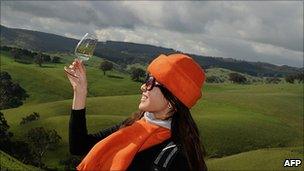EU and Australia toast wine labelling deal
- Published

Australian wines have captured a big slice of the European market
A new labelling deal with Australia may make Europe's winemakers feel more than a little light-headed as imitations will no longer be sold with names like champagne and sherry.
Australian producers will not be able to use 11 prestigious European drink labels.
Australia also gets protection for 112 of its "geographical indicators" (GIs), including Barossa and Coonawarra.
Australia exported wine worth 643m euros (£530m) to the EU last year.
Europe is the biggest market for Australian wine exporters.
The European Commission says EU wine exports to Australia totalled 68m euros (£56m) in 2009.
The new labelling rules, replacing an agreement signed in 1994, went into force on Wednesday but producers will have a year to phase out their use of protected brand names.
Australia has secured pan-EU recognition of 16 more Australian wine-making techniques, including the use of oak chips or resin to affect the flavour. The 1994 agreement recognised 28 Australian practices.
Support on both sides
The Australian government says the new deal introduces simpler labelling and more flexible rules on blending and alcohol content for the country's vineyards.
"Australian wine producers will have to make fewer changes and concessions to sell their wine in the EC [European Community]," an Australian government statement said.
Australian producers will also be allowed to continue using quality terms such as cream, ruby, tawny and vintage for wines exported to the EU.
The EU Agriculture Commissioner, Dacian Ciolos, called the agreement "a win-win outcome" for both sides.
The protected European names also include burgundy, port, amontillado, claret and Auslese.
Australian Tokay will be phased out as a brand within 10 years. Genuine Tokay is a sweet white wine from Hungary.
Australian producers have already moved away from calling sparkling wines champagne, without a consumer backlash, the AFP news agency reports.
Many distinctively regional European foods also enjoy special status under EU law, including Parma ham and feta cheese.